 Forging Rivals: Race, Class, Law, and the Collapse of Postwar Liberalism
Forging Rivals: Race, Class, Law, and the Collapse of Postwar Liberalism
By Reuel Schiller
Forging Rivals spans three decades, after the end of World War II saw the rise and fall of a particular version of liberalism in which the state committed itself to promoting a modest form of economic egalitarianism while simultaneously embracing ethnic, racial, and religious pluralism. But by the mid-1970s, postwar liberalism was in a shambles: while its commitment to pluralism remained, its economic policies had been abandoned, and the Democratic Party, its primary political vehicle, was collapsing. Schiller attributes this demise to the legal architecture of postwar liberalism, arguing that postwar liberalism’s goals of advancing economic egalitarianism and promoting pluralism ultimately conflicted with each other. Through the use of specific historical examples, Schiller demonstrates that postwar liberalism was riddled with legal and institutional contradictions that undermined progressive politics in the mid-twentieth-century United States.
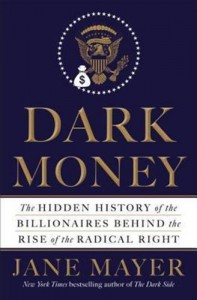 Dark Money: Hidden History of the Billionaires Behind the Rise of the Radical Right
Dark Money: Hidden History of the Billionaires Behind the Rise of the Radical Right
By Jane Meyer
Dark Money answers the questions: Why is America living in an age of profound economic inequality? Why, despite the desperate need to address climate change, have even modest environmental efforts been defeated again and again? Why have protections for employees been decimated? Why do hedge-fund billionaires pay a far lower tax rate than middle-class workers? The conventional answer is that a popular uprising against “big government” led to the ascendancy of a broad-based conservative movement. But as Jane Mayer shows in this powerful, meticulously reported history, a network of exceedingly wealthy people with extreme libertarian views bankrolled a systematic, step-by-step plan to fundamentally alter the American political system.
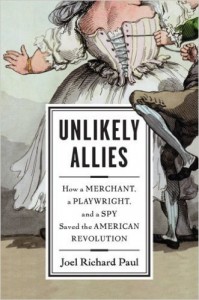 Unlikely Allies: How a Merchant, a Playwright, and a Spy Saved the American Revolution
Unlikely Allies: How a Merchant, a Playwright, and a Spy Saved the American Revolution
By Joel Richard Paul
Unlikely Alliesis a gripping true story of how three men used espionage, betrayal, and sexual deception to help win the American Revolution. It is the story of three remarkable historical figures. Silas Deane was a Connecticut merchant and delegate to the Continental Congress as the American colonies struggled to break with England. Caron de Beaumarchais was a successful playwright who wrote The Barber of Seville and The Marriage of Figaro. And the flamboyant and mysterious Chevalier d’Eon? officer, diplomat, and sometime spy?was the talk of London and Paris. Is the Chevalier a man or a woman?
When Deane is sent to France to convince the French government to support the revolutionary cause, he enlists the help of Beaumarchais. Together, they successfully smuggle weapons, ammunition, and supplies to New England just in time for the crucial Battle of Saratoga, which turned the tide of the American Revolution. And the catalyst for Louis XVI’s support of the Americans against England was the Chevalier d’Eon, whose decision to declare herself a woman helped to lead to the Franco-American alliance. These three people spin a fascinating web of political intrigue and international politics that stretches across oceans as they ricochet from Versailles to Georgian London to the Pennsylvania State House (now Independence Hall) in Philadelphia. Each man has his own reasons for wanting to see America triumph over the British, and each contends daily with the certainty that no one is what they seem. The line between friends and enemies is blurred, spies lurk in every corner, and the only way to survive is to trust no one.
An edge-of-your-seat story full of fascinating characters and lavish with period detail and sense of place, Unlikely Allies is Revolutionary history in all of its juicy, lurid glory.
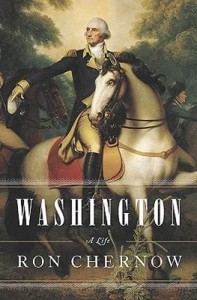 Washington, a Life
Washington, a Life
By Ron Chernow
Washington, a Life has a breadth & depth matched by no other one-volume life. This crisply paced narrative carries readers thru Washington’s troubled boyhood, his precocious feats in the French & Indian War, his creation of Mt Vernon, his heroic exploits with the Continental Army, his presiding over the Constitutional Convention & his performance as the 1st president. This work, based on massive research, brings to vivid life a dashing, passionate man of fiery opinions & many moods. Probing his private life, his fraught relationship with his crusty mother, his often conflicted feelings toward his adopted children & grandchildren, his marriage to Martha & his complex behavior as a slave master. At the same time this is an astute portrait of a canny politician who knew how to inspire people. Not only did Washington gather around himself the foremost figures of the age, including Madison, Hamilton, Adams & Jefferson, but he also orchestrated their actions to shape the new federal government, define the separation of powers & establish the office of the presidency. This recount of the formative events of America’s founding should be read by everyone.
 Mass Incarceration on Trial: A Remarkable Court Decision and the Future of Prisons in America
Mass Incarceration on Trial: A Remarkable Court Decision and the Future of Prisons in America
By Jonathan Simon
For nearly forty years, the United States has been gripped by policies that have placed more than 2.5 million Americans in jails and prisons designed to hold a fraction of that number of inmates. Our prisons are not only vast and overcrowded, they are degrading, relying on racist gangs, lockdowns, and Supermax-style segregation units to maintain a tenuous order. In short, mass incarceration has proven to be a fiscal and penological disaster.
A landmark 2011 Supreme Court decision, Brown v. Plata, has opened an unexpected escape route from this trap of “tough on crime” politics and points toward values that could restore legitimate order to American prisons and ultimately lead to the dismantling of “mass incarceration.” Berkeley law professor Jonathan Simon, an internationally renowned critic of mass incarceration and the war on crime, argues that, much like the epic school segregation cases of the last century, this new case represents a major breakthrough in jurisprudence. Along with twenty years of litigation over medical and mental health care in California prisons, the 2011 Brown decision moves us from a hollowed-out vision of civil rights to the threshold of human rights.
Exposing the priority of politics over rational penal policy and debunking the premise that these policies are necessary for public safety, this perceptive and groundbreaking book urges us to seize the opportunity to replace mass incarceration with a system anchored in the preservation of human dignity.
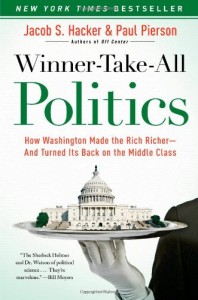 Winner Take All – Politics
Winner Take All – Politics
By Jacob S. Hacker and Paul Pierson
A groundbreaking work that identifies the real culprit behind one of the great economic crimes of our time— the growing inequality of incomes between the vast majority of Americans and the richest of the rich.
We all know that the very rich have gotten a lot richer these past few decades while most Americans haven’t. In fact, the exorbitantly paid have continued to thrive during the current economic crisis, even as the rest of Americans have continued to fall behind. Why do the “haveit- alls” have so much more? And how have they managed to restructure the economy to reap the lion’s share of the gains and shift the costs of their new economic playground downward, tearing new holes in the safety net and saddling all of us with increased debt and risk? Lots of so-called experts claim to have solved this great mystery, but no one has really gotten to the bottom of it—until now.
In their lively and provocative Winner-Take-All Politics, renowned political scientists Jacob S. Hacker and Paul Pierson demonstrate convincingly that the usual suspects—foreign trade and financial globalization, technological changes in the workplace, increased education at the top—are largely innocent of the charges against them. Instead, they indict an unlikely suspect and take us on an entertaining tour of the mountain of evidence against the culprit. The guilty party is American politics. Runaway inequality and the present economic crisis reflect what government has done to aid the rich and what it has not done to safeguard the interests of the middle class. The winner-take-all economy is primarily a result of winner-take-all politics.
In an innovative historical departure, Hacker and Pierson trace the rise of the winner-take-all economy back to the late 1970s when, under a Democratic president and a Democratic Congress, a major transformation of American politics occurred. With big business and conservative ideologues organizing themselves to undo the regulations and progressive tax policies that had helped ensure a fair distribution of economic rewards, deregulation got under way, taxes were cut for the wealthiest, and business decisively defeated labor in Washington. And this transformation continued under Reagan and the Bushes as well as under Clinton, with both parties catering to the interests of those at the very top. Hacker and Pierson’s gripping narration of the epic battles waged during President Obama’s first two years in office reveals an unpleasant but catalyzing truth: winner-take-all politics, while under challenge, is still very much with us.
Winner-Take-All Politics—part revelatory history, part political analysis, part intellectual journey— shows how a political system that traditionally has been responsive to the interests of the middle class has been hijacked by the superrich. In doing so, it not only changes how we think about American politics, but also points the way to rebuilding a democracy that serves the interests of the many rather than just those of the wealthy few.
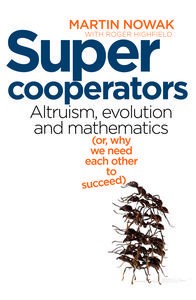 Super Cooperators: Altruism, Evolution, and Why We Need Each Other to Succeed
Super Cooperators: Altruism, Evolution, and Why We Need Each Other to Succeed
By Martin Nowak with Roger Highfield
Evolution is often seen as a strictly competitive endeavor. Nowak and Highfield turn an important aspect of evolutionary theory on its head to explain why cooperation, not competition, has always been the key to the evolution of complexity. With quantitative analysis, wit and clarity, they make the case that cooperation, not competition, is the defining human trait.
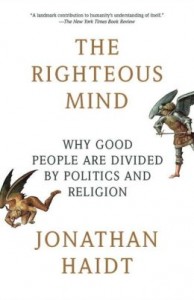 The Righteous Mind: Why Good People Are Divided by Politics and Religion
The Righteous Mind: Why Good People Are Divided by Politics and Religion
By Jonathan Haidt
Haidt talks about the question of why politics is so often bitterly divisive. He asserts that human morality has evolved on the basis of six distinct moral foundations, and conservative politics incorporates all of those foundations while liberal politics is based primarily only on three of those foundations. This may be helpful in understanding and talking with our conservative friends.
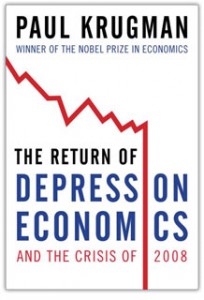 The Return of Depression Economics and the Crisis of 2008
The Return of Depression Economics and the Crisis of 2008
By Paul Krugman
Paul Krugman warns that, like diseases that have become resistant to antibiotics, the economic maladies that caused the Great Depression have made a comeback. He lays bare the 2008 financial crisis–the greatest since the 1930s–tracing it to the failure of regulation to keep pace with an out-of-control financial system. He also tells us how to contain the crisis and turn around a world economy sliding into a deep recession.
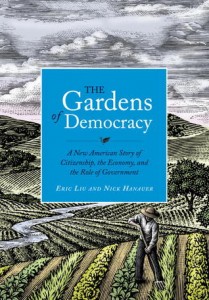 The Gardens of Democracy: A New American Story of Citizenship, the Economy, and the Role of Government
The Gardens of Democracy: A New American Story of Citizenship, the Economy, and the Role of Government
By Nick Hanauer and Eric Liu
This is an optimistic summons to improve our role as citizens in a democratic society. They note that the structure of American democracy is based on the cutting-edge knowledge of the 18th century, and we have learned some things about self-interest, social behaviors, and how the world works in the past 230 years. They view our democracy and economy more as a garden (or ecosystem) to be tended, rather than as machines to be maintained, and they articulate several principles for evolving our democracy.
 Dark Money: Hidden History of the Billionaires Behind the Rise of the Radical Right
Dark Money: Hidden History of the Billionaires Behind the Rise of the Radical RightBy Jane Meyer
Dark Money answers the questions: Why is America living in an age of profound economic inequality? Why, despite the desperate need to address climate change, have even modest environmental efforts been defeated again and again? Why have protections for employees been decimated? Why do hedge-fund billionaires pay a far lower tax rate than middle-class workers? The conventional answer is that a popular uprising against “big government” led to the ascendancy of a broad-based conservative movement. But as Jane Mayer shows in this powerful, meticulously reported history, a network of exceedingly wealthy people with extreme libertarian views bankrolled a systematic, step-by-step plan to fundamentally alter the American political system.
 Unlikely Allies: How a Merchant, a Playwright, and a Spy Saved the American Revolution
Unlikely Allies: How a Merchant, a Playwright, and a Spy Saved the American Revolution By Joel Richard Paul
Unlikely Alliesis a gripping true story of how three men used espionage, betrayal, and sexual deception to help win the American Revolution. It is the story of three remarkable historical figures. Silas Deane was a Connecticut merchant and delegate to the Continental Congress as the American colonies struggled to break with England. Caron de Beaumarchais was a successful playwright who wrote The Barber of Seville and The Marriage of Figaro. And the flamboyant and mysterious Chevalier d’Eon? officer, diplomat, and sometime spy?was the talk of London and Paris. Is the Chevalier a man or a woman?
 Washington, a Life
Washington, a LifeBy Ron Chernow
Washington, a Life has a breadth & depth matched by no other one-volume life. This crisply paced narrative carries readers thru Washington’s troubled boyhood, his precocious feats in the French & Indian War, his creation of Mt Vernon, his heroic exploits with the Continental Army, his presiding over the Constitutional Convention & his performance as the 1st president. This work, based on massive research, brings to vivid life a dashing, passionate man of fiery opinions & many moods. Probing his private life, his fraught relationship with his crusty mother, his often conflicted feelings toward his adopted children & grandchildren, his marriage to Martha & his complex behavior as a slave master. At the same time this is an astute portrait of a canny politician who knew how to inspire people. Not only did Washington gather around himself the foremost figures of the age, including Madison, Hamilton, Adams & Jefferson, but he also orchestrated their actions to shape the new federal government, define the separation of powers & establish the office of the presidency. This recount of the formative events of America’s founding should be read by everyone.
 Mass Incarceration on Trial: A Remarkable Court Decision and the Future of Prisons in America
Mass Incarceration on Trial: A Remarkable Court Decision and the Future of Prisons in AmericaBy Jonathan Simon
For nearly forty years, the United States has been gripped by policies that have placed more than 2.5 million Americans in jails and prisons designed to hold a fraction of that number of inmates. Our prisons are not only vast and overcrowded, they are degrading, relying on racist gangs, lockdowns, and Supermax-style segregation units to maintain a tenuous order. In short, mass incarceration has proven to be a fiscal and penological disaster.
A landmark 2011 Supreme Court decision, Brown v. Plata, has opened an unexpected escape route from this trap of “tough on crime” politics and points toward values that could restore legitimate order to American prisons and ultimately lead to the dismantling of “mass incarceration.” Berkeley law professor Jonathan Simon, an internationally renowned critic of mass incarceration and the war on crime, argues that, much like the epic school segregation cases of the last century, this new case represents a major breakthrough in jurisprudence. Along with twenty years of litigation over medical and mental health care in California prisons, the 2011 Brown decision moves us from a hollowed-out vision of civil rights to the threshold of human rights.
Exposing the priority of politics over rational penal policy and debunking the premise that these policies are necessary for public safety, this perceptive and groundbreaking book urges us to seize the opportunity to replace mass incarceration with a system anchored in the preservation of human dignity.
 Winner Take All – Politics
Winner Take All – Politics
By Jacob S. Hacker and Paul Pierson
A groundbreaking work that identifies the real culprit behind one of the great economic crimes of our time— the growing inequality of incomes between the vast majority of Americans and the richest of the rich.
We all know that the very rich have gotten a lot richer these past few decades while most Americans haven’t. In fact, the exorbitantly paid have continued to thrive during the current economic crisis, even as the rest of Americans have continued to fall behind. Why do the “haveit- alls” have so much more? And how have they managed to restructure the economy to reap the lion’s share of the gains and shift the costs of their new economic playground downward, tearing new holes in the safety net and saddling all of us with increased debt and risk? Lots of so-called experts claim to have solved this great mystery, but no one has really gotten to the bottom of it—until now.
In their lively and provocative Winner-Take-All Politics, renowned political scientists Jacob S. Hacker and Paul Pierson demonstrate convincingly that the usual suspects—foreign trade and financial globalization, technological changes in the workplace, increased education at the top—are largely innocent of the charges against them. Instead, they indict an unlikely suspect and take us on an entertaining tour of the mountain of evidence against the culprit. The guilty party is American politics. Runaway inequality and the present economic crisis reflect what government has done to aid the rich and what it has not done to safeguard the interests of the middle class. The winner-take-all economy is primarily a result of winner-take-all politics.
In an innovative historical departure, Hacker and Pierson trace the rise of the winner-take-all economy back to the late 1970s when, under a Democratic president and a Democratic Congress, a major transformation of American politics occurred. With big business and conservative ideologues organizing themselves to undo the regulations and progressive tax policies that had helped ensure a fair distribution of economic rewards, deregulation got under way, taxes were cut for the wealthiest, and business decisively defeated labor in Washington. And this transformation continued under Reagan and the Bushes as well as under Clinton, with both parties catering to the interests of those at the very top. Hacker and Pierson’s gripping narration of the epic battles waged during President Obama’s first two years in office reveals an unpleasant but catalyzing truth: winner-take-all politics, while under challenge, is still very much with us.
Winner-Take-All Politics—part revelatory history, part political analysis, part intellectual journey— shows how a political system that traditionally has been responsive to the interests of the middle class has been hijacked by the superrich. In doing so, it not only changes how we think about American politics, but also points the way to rebuilding a democracy that serves the interests of the many rather than just those of the wealthy few.
 Super Cooperators: Altruism, Evolution, and Why We Need Each Other to Succeed
Super Cooperators: Altruism, Evolution, and Why We Need Each Other to Succeed
By Martin Nowak with Roger Highfield
Evolution is often seen as a strictly competitive endeavor. Nowak and Highfield turn an important aspect of evolutionary theory on its head to explain why cooperation, not competition, has always been the key to the evolution of complexity. With quantitative analysis, wit and clarity, they make the case that cooperation, not competition, is the defining human trait.
 The Righteous Mind: Why Good People Are Divided by Politics and Religion
The Righteous Mind: Why Good People Are Divided by Politics and Religion
By Jonathan Haidt
Haidt talks about the question of why politics is so often bitterly divisive. He asserts that human morality has evolved on the basis of six distinct moral foundations, and conservative politics incorporates all of those foundations while liberal politics is based primarily only on three of those foundations. This may be helpful in understanding and talking with our conservative friends.
 The Return of Depression Economics and the Crisis of 2008
The Return of Depression Economics and the Crisis of 2008
By Paul Krugman
Paul Krugman warns that, like diseases that have become resistant to antibiotics, the economic maladies that caused the Great Depression have made a comeback. He lays bare the 2008 financial crisis–the greatest since the 1930s–tracing it to the failure of regulation to keep pace with an out-of-control financial system. He also tells us how to contain the crisis and turn around a world economy sliding into a deep recession.
 The Gardens of Democracy: A New American Story of Citizenship, the Economy, and the Role of Government
The Gardens of Democracy: A New American Story of Citizenship, the Economy, and the Role of Government
By Nick Hanauer and Eric Liu
This is an optimistic summons to improve our role as citizens in a democratic society. They note that the structure of American democracy is based on the cutting-edge knowledge of the 18th century, and we have learned some things about self-interest, social behaviors, and how the world works in the past 230 years. They view our democracy and economy more as a garden (or ecosystem) to be tended, rather than as machines to be maintained, and they articulate several principles for evolving our democracy.
 Super Cooperators: Altruism, Evolution, and Why We Need Each Other to Succeed
Super Cooperators: Altruism, Evolution, and Why We Need Each Other to SucceedBy Martin Nowak with Roger Highfield
Evolution is often seen as a strictly competitive endeavor. Nowak and Highfield turn an important aspect of evolutionary theory on its head to explain why cooperation, not competition, has always been the key to the evolution of complexity. With quantitative analysis, wit and clarity, they make the case that cooperation, not competition, is the defining human trait.
 The Righteous Mind: Why Good People Are Divided by Politics and Religion
The Righteous Mind: Why Good People Are Divided by Politics and ReligionBy Jonathan Haidt
Haidt talks about the question of why politics is so often bitterly divisive. He asserts that human morality has evolved on the basis of six distinct moral foundations, and conservative politics incorporates all of those foundations while liberal politics is based primarily only on three of those foundations. This may be helpful in understanding and talking with our conservative friends.
 The Return of Depression Economics and the Crisis of 2008
The Return of Depression Economics and the Crisis of 2008
By Paul Krugman
Paul Krugman warns that, like diseases that have become resistant to antibiotics, the economic maladies that caused the Great Depression have made a comeback. He lays bare the 2008 financial crisis–the greatest since the 1930s–tracing it to the failure of regulation to keep pace with an out-of-control financial system. He also tells us how to contain the crisis and turn around a world economy sliding into a deep recession.
 The Gardens of Democracy: A New American Story of Citizenship, the Economy, and the Role of Government
The Gardens of Democracy: A New American Story of Citizenship, the Economy, and the Role of Government
By Nick Hanauer and Eric Liu
This is an optimistic summons to improve our role as citizens in a democratic society. They note that the structure of American democracy is based on the cutting-edge knowledge of the 18th century, and we have learned some things about self-interest, social behaviors, and how the world works in the past 230 years. They view our democracy and economy more as a garden (or ecosystem) to be tended, rather than as machines to be maintained, and they articulate several principles for evolving our democracy.
